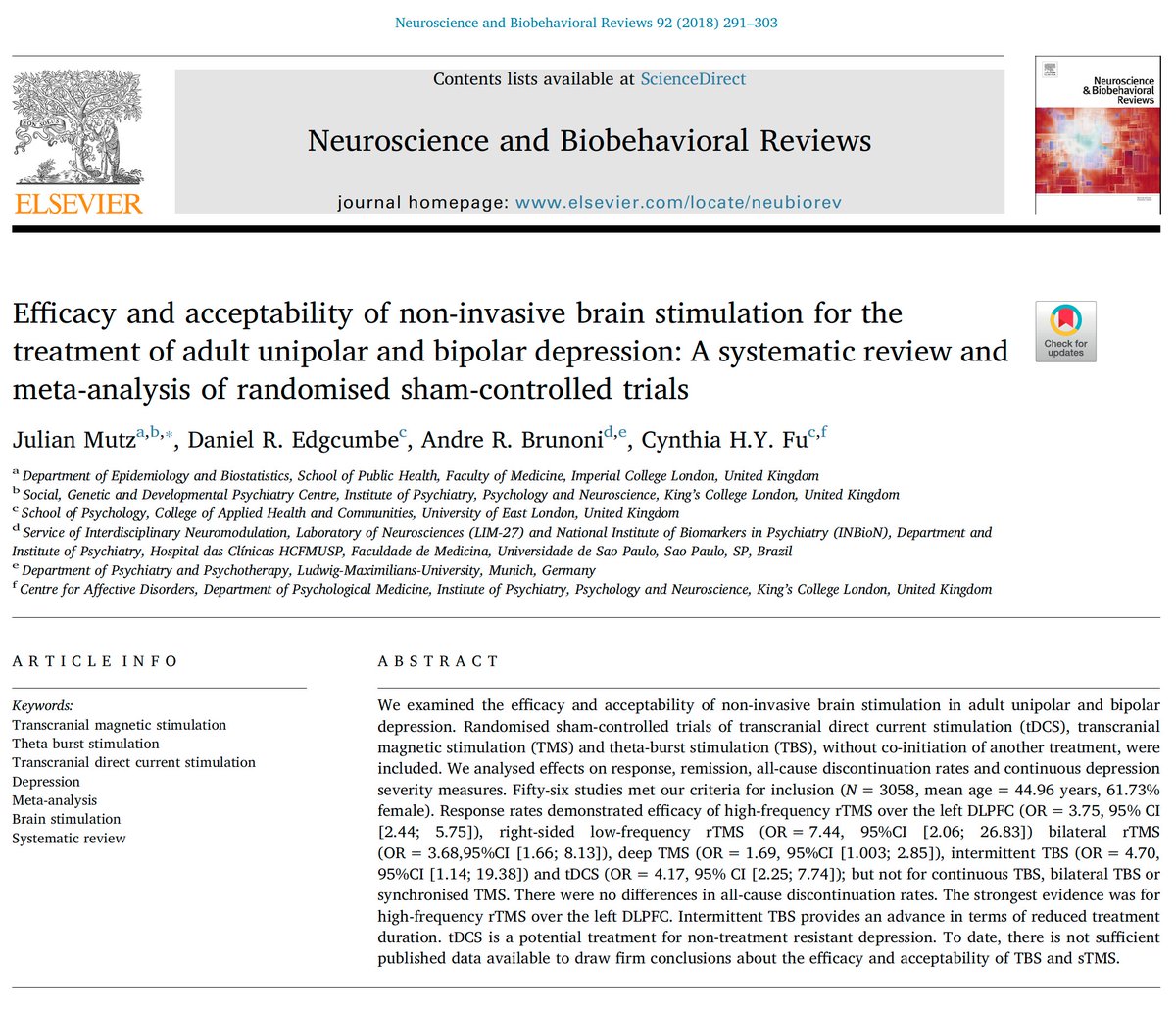
(1/9) A brief thread by @julianmutz on brain stimulation treatments for individuals with #depression
Please RT! #Psychiatry #Brainstimulation
Some recent findings summarised below 👇
Please RT! #Psychiatry #Brainstimulation
Some recent findings summarised below 👇

(2/9) Pharmacological & psychological treatments for depression, while effective in many patients, have limited efficacy in some patients and/or are sometimes not well tolerated.
Brain stimulation could be considered as additional or alternative treatment in these patients.
Brain stimulation could be considered as additional or alternative treatment in these patients.
(3/9) In a 2018 meta-analysis we analysed data from 54 clinical trials that included a total of almost 3000 patients.
doi.org/10.1016/j.neub…
doi.org/10.1016/j.neub…

(4/9) The evidence supported efficacy of
☑️HF-L rTMS
☑️LF-R rTMS
☑️bilateral rTMS
☑️deep TMS
☑️intermittent TBS
☑️tDCS
but not
✖️continuous TBS
✖️bilateral TBS
✖️synchronised TMS
There were no differences in all-cause discontinuation rates (used to estimate acceptability).

☑️HF-L rTMS
☑️LF-R rTMS
☑️bilateral rTMS
☑️deep TMS
☑️intermittent TBS
☑️tDCS
but not
✖️continuous TBS
✖️bilateral TBS
✖️synchronised TMS
There were no differences in all-cause discontinuation rates (used to estimate acceptability).


(5/9) Subsequently we published a network meta-analysis in @bmj_latest doi.org/10.1136/bmj.l1…
This is the most comprehensive NMA of brain stimulation to date and included 18 active treatment protocols 👇 & sham, with a total of up to 6750 patients.
@KingsIoPPN @kclcfad
This is the most comprehensive NMA of brain stimulation to date and included 18 active treatment protocols 👇 & sham, with a total of up to 6750 patients.
@KingsIoPPN @kclcfad

(6/9) We found that most treatment protocols were more efficacious than sham (see data for response rates below) & were not associated with higher all-cause discontinuation rates.
Previous thread:

Previous thread:
https://twitter.com/julianmutz/status/1111214359685025793?s=20


(7/9) In this network meta-analysis we did not examine potential cognitive effects of brain stimulation.
However, work in collaboration with @kiebs @HurlemannRene is ongoing, see our protocol in @BMJ_Open
bmjopen.bmj.com/content/9/2/e0… #openaccess #brainstimulation
However, work in collaboration with @kiebs @HurlemannRene is ongoing, see our protocol in @BMJ_Open
bmjopen.bmj.com/content/9/2/e0… #openaccess #brainstimulation

(8/9) While most brain stimulation studies included patients with treatment resistant depression, more data are needed in medication-naive and first onset depression, as we have argued in a 2019 editorial in @TheBJPsych
doi.org/10.1192/bjp.20…
@kiebs @HurlemannRene
doi.org/10.1192/bjp.20…
@kiebs @HurlemannRene

(9/9) In a recent review in @IntRevPsych we also discussed the possibility of using transcranial direct current stimulation #tDCS as a first-line treatment in some patients, especially because of tDCS could be used in the home environment.
doi.org/10.1080/095402… @RaeResearch
doi.org/10.1080/095402… @RaeResearch

• • •
Missing some Tweet in this thread? You can try to
force a refresh


